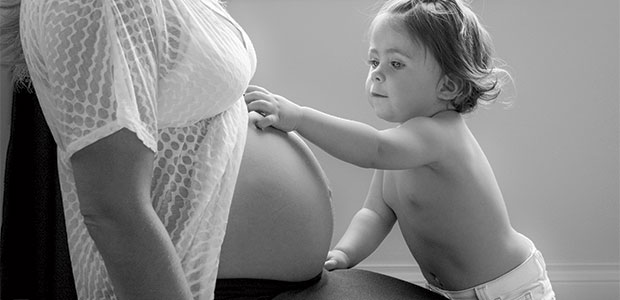Advertisement
Pregnant Again!
What to expect the second time around

Being pregnant for the second time is exciting. No longer are you nervous about every baby movement and poke. But your previous experience—while useful—doesn’t guarantee your pregnancy will be easy. In fact, many women find the symptoms of their second pregnancy to be unexpectedly different than their first.
Whether you’re pregnant for the second, third, or fourth time, preparing for and managing your symptoms in a healthy and natural way is key to a successful experience. If you’re expecting again, here are some symptoms you can anticipate, along with some natural ways to manage them.
You’re more tired
When pregnant for the second time, women still experience the same fatigue-causing hormonal changes they did during their first pregnancy, but they are less likely to get enough sleep or eat the balanced meals needed to increase energy. Dealing with at least one child, going to work, and helping maintain a household is also bound to compound exhaustion during pregnancy.
How to manage?
Women are encouraged to make sleep a priority—as hard as that may seem. Laura Nurse, a naturopathic doctor from Newfoundland, recommends using reflexology and massage to aid in relaxation and improve energy, especially during the first trimester.
Beth MacKenzie, an Ontario-based doula and hypnobirthing practitioner, suggests focusing on self-care and communicating with your loved ones when you are feeling too exhausted and need a break to help with tiredness and stress that is sure to accompany a second pregnancy.
You show earlier
As your uterus has already experienced the stretching required to carry one baby to term, it has a head start when it comes to baby number two. You will likely notice an increase in belly size by the end of your first trimester and, along with it, more aches and pains in your hips, legs, and lower back.
How to manage?
“Do not focus on your size, or speed at which your belly is growing, especially when you have already carried another baby,” suggest Tracy Hyderman and Debbie Vey, both midwives from Saskatchewan.
Instead, they recommend focusing on eating a healthy diet and engaging in moderate exercise. They also recommend chiropractic or massage care during pregnancy to reduce back and hip pain. Having enough magnesium in your diet while pregnant, through supplementation or eating magnesium-rich foods, may also assist in minimizing leg cramps.
Labour is shorter
Yes, your body is likely to begin to show your second pregnancy sooner, but it is also likely to labour for a shorter period of time when you are ready to give birth. “Generally, mothers labour much faster during subsequent pregnancies as their body already knows the signs,” says Vey. As your cervix will dilate more quickly, labour will be much shorter and it is likely that you will push for a shorter amount of time, as your vaginal muscles “give” more easily to the baby’s size.
How to manage?
MacKenzie recommends using an experienced labour coach, taking a new childbirth education class, and considering water or massage to ease discomfort during the birthing process. Kegel exercises are also an excellent way to prepare the muscles that will be used when pushing.
Afterpains are stronger
Many women are not prepared for the intensity of afterpains the second time around. As your uterus has less muscle tone and elasticity, it will not contract as quickly after delivery. The uterus is likely to clamp down firmly in an effort to prevent heavy blood loss, resulting in stronger post-birth pains.
How to manage?
A variety of methods to ease the pain can be used, including a warmed rice sock or hot water bottle on your abdomen, light stretching, keeping your bladder empty, or lower abdomen massage. Afterpains should gradually decrease in intensity, but may last for seven to 10 days postpartum.
The post-baby weight may stay
Whether or not you were at your “ideal weight” before pregnancy, it is likely that your post-baby weight will not come off as quickly after giving birth to baby number two. It may be the new routines, your age, or the fact that you weighed more when you became pregnant this time, but it is important to remember that weight loss after birth is a process that takes time.
How to manage?
It’s important to keep your body moving, but as your body needs some time to recover postpartum, check with your health care practitioner before starting vigorous exercise. New mothers are encouraged to hydrate; eat regular, healthy meals; and, above all, be gentle with themselves. “Remember that your postpartum body is exactly as it should be,” says Hyderman. “Giving birth to a baby is a beautiful thing; don’t worry about anything other than your baby.”
It is important to remember that each pregnancy—and each pregnant woman—will have its own set of challenges to manage. But as a mom of two, take my word for it when I say that the end result makes every symptom worth it.
Eating for two—still
Though you’ve welcomed your new baby into the world, you’ll still be eating for two while you’re breastfeeding—passing on all those healthy nutrients. But while you want to ensure a healthy diet for baby’s best health, you’ll also want to pay attention to your own ongoing health, including shedding any excess weight you may be carrying.
A healthy diet, physical activity, and plenty of patience is the best way to achieve a healthy postpartum weight.
- Eat plenty of fibre-rich foods such as fruits, vegetables, and whole grains. Fibre will keep you sated longer and will also help maintain a healthy digestive system.
- Limit the amount of time you watch television or sit at your computer.
- Take baby for a walk. Walking for at least 30 minutes a day has been shown to reduce the chances of keeping those extra pounds and also helps avoid adding new ones.




